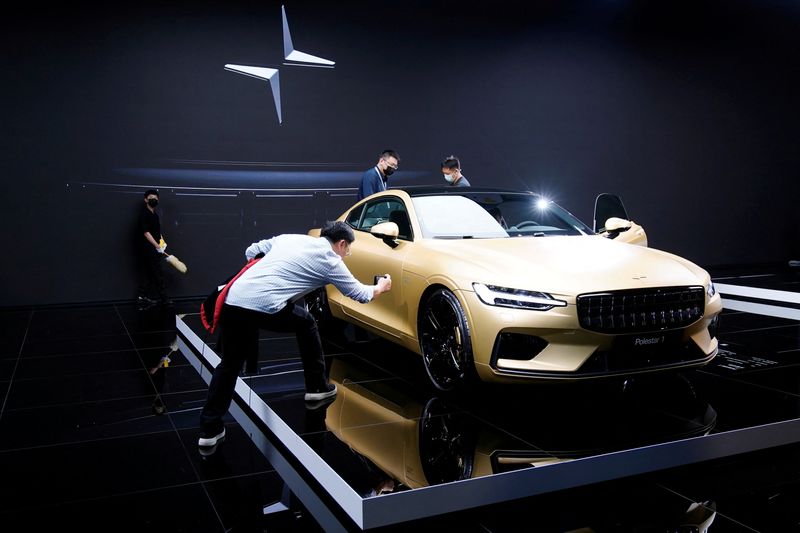SHANGHAI (Reuters) - Automakers in China are ramping up exports of hybrid vehicles to Europe and planning more models for the key market, exposing the limits of the European Union's electric vehicle tariff scheme.
The bloc's latest EV tariffs to protect its auto industry from a flood of cheap Chinese imports do not apply to hybrid cars. That could see major brands such as China's top EV maker BYD (SZ:002594) continue expansion in the region, analysts say.
Some manufacturers are also shifting production and assembly to Europe to lower the cost around tariffs.
"The increase is driven by Chinese OEMs shifting toward PHEVs (plug-in hybrids) as a way to sidestep the new EU tariffs on BEV (battery-powered EVs) imports from China," said Murtuza Ali, an analyst at Counterpoint Research.
He expects China's hybrid exports to Europe to grow 20% this year and even faster next year.
EU tariffs of up to 45.3% on Chinese EV imports came into effect in late October to counter what the European Commission says are unfair subsidies that helped create spare production capacity of 3 million EVs per year in China, twice the size of the EU market.
The anti-subsidy investigations on Chinese EV imports, which began in October 2023, and slowing car sales in China from an economic slowdown, have led some automakers to change their European strategy to focus more on hybrid exports, the data shows.
Hybrid cars, which run on a combination of gasoline and electricity, are gaining in popularity as buyers consider them an affordable compromise between all-combustion and all-electric.
From July to October, hybrid exports to Europe more than tripled to 65,800 units from the same period a year earlier, reversing a trend of sliding sales until earlier this year and in 2023, according to China Passenger Car Association data.
That helped exports of plug-in hybrids and conventional hybrids account for 18% of China's total vehicle sales to Europe in the third quarter, doubling from 9% in the first quarter. The proportion of EV shipments, however, fell to 58% from 62% during the same period.
The trend is likely to gain further momentum.
China, which overtook Japan as the world's biggest auto exporter last year aided by its dominance in EVs, is stepping up its export drive to address overcapacity at home, analysts say.
Given 100% tariffs on Chinese-made EVs in the United States and Canada, Europe is also one of the most obvious outlets for Chinese auto makers.
The European Commission did not immediately reply to a request for comment on rising hybrid imports from China.
MORE HYBRID MODELS
Major Chinese automakers could upend the European plug-in hybrid market dominated by European and Japanese firms as they meet rising demand for affordable cars with better fuel economy amid rising inflation.
BYD is taking on Volkswagen (ETR:VOWG_p) and Toyota (NYSE:TM) in Europe with its first plug-in hybrid model for the region, the Seal U DM-i.
The model is priced from 35,900 euros ($37,700), 700 euros lower than VW's best-selling PHEV model Tiguan and 10% cheaper than Toyota's C-HR PHEV.
It is also considering production of both EVs and hybrids in its Hungarian plant, Chinese official media China Auto News reported.
"The segment could see bigger growth potentials with Chinese automakers bringing more affordable options to Europe that are attractive to cost-sensitive consumers," said Yale Zhang, managing director at Automotive Foresight.
SAIC, whose EV exports to the EU face the highest additional rate of 35.3%, has said it plans products with various powertrain systems for the European market.
Geely, China's second-largest automaker by sales, launched a new plug-in hybrid under its brand Lynk & Co for Europe last month.
"The recent increased introduction of electrified hybrid models to markets around the world by global automakers is in line with consumer demands and purchasing trends," Geely said in response to Reuters questions. It did not comment on trade restrictions.
Japanese automakers too are taking advantage of the growth of conventional hybrids in Europe this year and addressing their overcapacity problems in China.
Honda (NYSE:HMC), which suffered a 29% slump in China vehicle sales in the first nine months of this year, exports two conventional hybrids, one plug-in hybrid and one pure EV model from China to Europe.
While increasing exports from China could trigger intense price competition in Europe's hybrid vehicle market, some experts caution Chinese firms are likely to tread more carefully for fear of sparking another round of EU tariffs.

"If BYD takes Qin Plus to Europe at a price of 20,000 euros, I am sure it would trigger another earthquake," Zhang said, referring to its hybrid sedan.
($1 = 0.9520 euros)